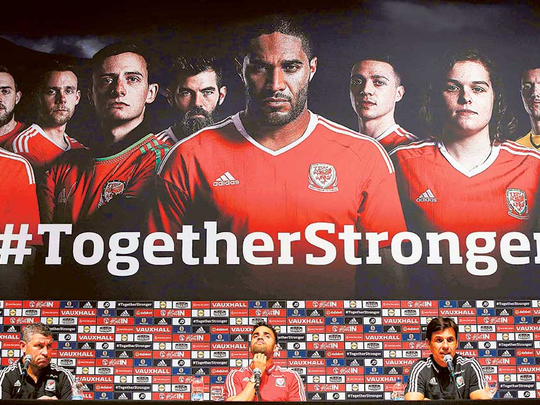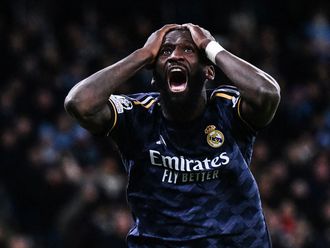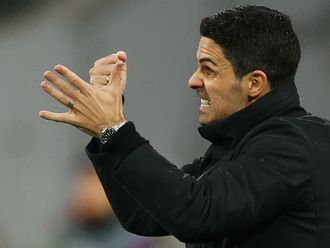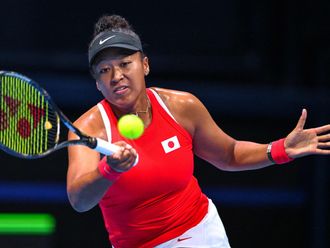
Dinard: Together. Stronger. Two words that started out as a marketing slogan following a brainstorming session at the Dragon Park national football centre in 2013 but which have since come to encapsulate a sporting fairy tale.
It is a message that is now emblazoned everywhere this Wales football team goes, including the training base and coastal team hotel in their quaint Brittany resort of Dinard.
The aim was to create a structure that gave Wales the best possible chance on the international stage through growing the game from grass roots to the stage now where football participation is three times higher than rugby union, the traditional sport of Wales. The viewing figures for Friday’s quarter-final win against Belgium was also the largest in Wales for any sporting event.
Wales also intend to continue the work of Brian Flynn, the former Under-21 manager, who successfully identified young English-born talent with a Welsh parent or grandparent. Nine of this squad fit that profile but, crucially, have been nurtured through the age-group teams.
The quiet Galactico
The foundations might now be solid but it is also obvious that the success of this Wales team hinges heavily on the presence of a player in Gareth Bale who has continued this past month on the path to greatness.
His on-field impact is easily quantified: Seven out of the team’s 11 goals in qualifying and three more during the tournament.
But Bale has relentlessly talked up his teammates.
Questions about the prospect of winning the Golden Boot, the Ballon d’Or or a personal dual with Cristiano Ronaldo have all been met with the same response. “Irrelevant. I couldn’t care less as long as the team wins.” In repeatedly stating that Wales can win the tournament, Bale has also wiped away any trace of an inferiority complex. Bale’s quiet leadership has, says Chris Coleman even inspired him to greater heights as a manager.
“It’s up to all of us to try and get where he is,” said Coleman. “We have always settled for too little. To go that extra mile, you have got to be a bit different to what has come before.”
Fun and games
It is impossible to spend time around the Wales camp and not sense a drastic contrast with the suffocating pressure that has appeared to engulf a succession of England teams. Whereas the England players seemed almost frightened to share the banal details of an internal darts competition, Bale and friends have been providing daily updates on their quiz and table tennis competitions. For the record, Bale claimed that his team of Chris Gunter, Joe Allen, Hal Robson-Kanu, Danny Ward and Ben Davies had won for a sixth straight day after an outstanding ‘picture round’ identifying Premier League footballers. Bale has also happily revealed how the players comforted themselves after the England defeat with a group meal that included burger, chips and a Nutella pancake. The players also made an impromptu appearance at the local Davy’s bar last Sunday for some games of pool and cookie milkshakes.
Every match has been followed by a day off for the players to spend with their families before returning that evening to their base in Dinard, where the serious work then resumes without distraction. There has been no hint of players taking themselves overly seriously, no whiff of entitlement, no feelings of pressure or fear; just a group of people who are utterly immersed in the tournament — they watch every other match together at the team hotel — and are having the time of their lives. “It’s like being on holiday with your mates,” said Bale.
Gary Speed’s legacy
Football’s triviality in the face of such tragedy is obvious but it is also clear that Gary Speed’s influence, both practical and emotional, has been felt throughout this campaign. At a practical level, Speed was credited with overhauling the back room support structure so that Wales players were benefiting from the latest advances in sports science, medicine, technology and psychology. Speed, who spent 11 months as manager before his death in November 2012, had also been idolised by many of this current generation, including Aaron Ramsey. “He really believed that this team could go on and qualify for a major tournament,” said Ramsey.
Inspired leadership
Before what was their first game in a major international tournament for 58 years, Chris Coleman decided that there would be no need for a lengthy team-talk. He simply showed the Wales players a series of messages from their families. It was apparently perfectly judged and another example of Coleman’s superb management throughout this tournament.
Finding the right balance between overseeing a hugely professional training environment and keeping the players mentally fresh is something that has eluded far more experienced managers.
Yet in Wales’s decision to invest heavily in their training facilities — right down to sending their own groundsman out to prepare the pitches to allowing Bale to bring his personal physio from Real Madrid, the attention to back room detail has been striking. Bale even described Coleman as the best prepared coach he has played for. It is not something you might expect of a manager who has previously missed scheduled press conferences after a night out partying and then losing his passport. Coleman, though, admits himself that there was a period in his career when he regressed after beginning his managerial career at the exceptionally young age of 32. “When I decided to do everything I could to make myself better — and I had to make some serious choices — it made me improve,” he says. That identity has become ‘Together, Stronger’ and Coleman is adamant that it can inspire Wales to even greater peaks in the days and years to come.










